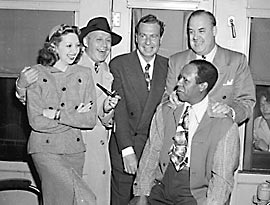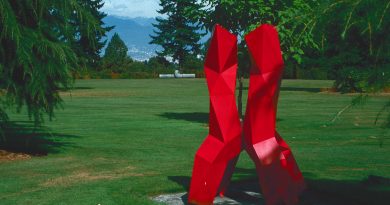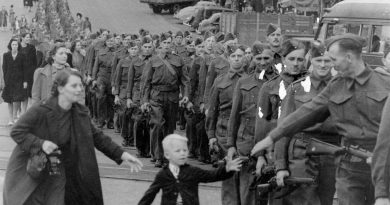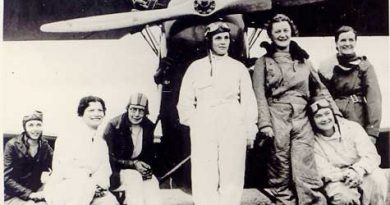1944
Above: Jack Benny and his radio show cast aboard a train at White Rock.
[Image: Vancouver City Archives]
*****************************************
You’ll note that these years include events listed under “Also in . . .” These are events for which we don’t have a specific date. If YOU know the specific date of an event shown there, please notify us . . . and cite the source! Many thanks!
*****************************************
January 18 Broadcasting and publishing executive Neil Soper was born.
January A strike at BC Electric lasted three weeks. Streetcars stopped running.
February 23 Leonard Frank, photographer, died, aged about 74. He came here from Germany in 1892, age 22, looking for gold, but that didn’t work out. Then he won a lottery in which first prize was a camera. Frank’s father was a professional photographer, and taught the craft to young Leonard. So he began to take pictures. For 50 years he took pictures. His nearly 50,000 images captured a now-vanished British Columbia with astonishing clarity and beauty. I swear you can see the stubble on the lumberjacks’ cheeks. Enjoy this extraordinary body of work in Cyril Leonoff’s multi-award-winning 1990 book Leonard Frank: An Enterprising Life, and check out the delightful story at this site.
March 26 The mayor attended a Vancouver ceremony marking the 123rd anniversary of Greek independence.
April 23 Jack Benny did his famous radio show from Vancouver. He brought his regular cast up from New York: Mary Livingstone, Phil Harris, Rochester, Dennis Day and announcer Don Wilson. What made the show particularly notable was that Mary Livingstone (real name Sadie Marks) had grown up in Vancouver. Old timers will recall that Mary got a lot of comic mileage about Jack’s age. He was forever 39.
That led to exchanges like this:
Jack: You know, Mary, being in Vancouver brings back memories to me, too. When I was in vaudeville, I played the Orpheum Theatre many a time. Did you know that?
Mary: Did I know that? Jack, every time you played here didn’t you notice a little girl in the third row in the aisle seat, with long blonde pigtails and a pink ribbon in her hair?
Jack: Well, I’ll be darned! Was that you?
Mary: No, that was my mother.
Jack: Now cut that out!
A little later Vancouver mayor Jack Cornett pops in as a special guest and Jack begins to pester him about the toll charge (25 cents) on the Lions Gate Bridge. Jack wonders if it might be possible to drop the toll so that he can see Grouse Mountain up close, instead of always through his telescope. Then the mood gets serious for a moment as Jack echoes Mayor Cornett’s plug for Canada’s Sixth Victory Loan, a fund-raising campaign to help the war effort.
Jack would visit Vancouver often, and was successful in helping to raise funds to save the Orpheum Theatre.
June 6 D-Day, the invasion at Normandy. More than a thousand planes and gliders began dropping paratroopers into Normandy in the dark hours before dawn. The push to recapture the Nazi-occupied continent was under way.
June 7 There is, on the wall of the military/medical museum at Jericho an INCREDIBLE letter by a medical officer from Vancouver of his experiences this day. He escaped death a dozen times. The Canadian Medical Association Journal for December 10, 2002 reprinted it. It’s far too long to reproduce here, but once read, never forgotten.
June 30 Charles Hill-Tout, ethnologist, died in Vancouver, aged 85. He was born September 28, 1858 in Buckland, England. He came to Canada in 1894, arrived in Vancouver in 1890. It was Hill-Tout who realized Vancouver’s Marpole Midden was the largest of its kind in North America. He founded his own school, Buckland College, on Burrard Street. After approximately a decade at Buckland, Hill-Tout gave up education and moved to a farm in the Abbotsford area, where he subsequently opened and operated a mill producing railway ties for the CPR. “ A devoted amateur anthropologist,” Constance Brissenden writes, “he focused on the Salish Indians of B.C. He was elected to the Royal Society of Canada in 1913, later became the president of its anthropological section. He was a president of the Art, Historical and Scientific Association of Vancouver [precursor to the Vancouver Museum], which published his Great Fraser Midden in 1938. His field reports were collected as The Salish People by Ralph Maud (1978). Asked by the CPR to name a new subdivision in Vancouver, Hill-Tout suggested Kitsilano, a modification of the name of the chiefs of the Squamish Band. He is the author of The Native Races of British North America: the Far West (1907).”
There is a curious anecdote (involving psychic powers) about Hill-Tout at this site.
July 22 The St Roch left Halifax to return to Vancouver through the Arctic (she will arrive October 16).
August 14 Vancouver City Council adopted Odessa, Ukraine as a sister city. To mark the occasion, the VSO gave a concert of Russian music. (That likely made a lot of Ukrainians angry, but they were an SSR at the time.)
August 15 Radio station CKNW signed on (unofficially) at 1230 on the dial—the 980 frequency was in the future—with 250 watts of power, after on-air testing which had started April 1. Its owner, Bill Rea, would launch many innovations in his new station: hourly newscasts, on-air 24 hours a day, all music, the Orphans’ Fund and man-on-the-street interviews. NW is still the top-rated radio station in the Greater Vancouver area.
What an impact Bill Rea made on local radio! And what unpromising beginnings! CKNW was a tiny station on the second floor of a nondescript hotel in New Westminster (far from the big boys in Vancouver) that played “cowboy” music. Rea started hourly newscasts—a local first—because he knew we wanted news of our troops overseas; he kept NW on 24 hours a day, another first; he started a people-on-the-street show called Roving Mike that lasted for decades, and he initiated the Orphans’ Fund that has raised millions for local kids. Look for the 1994 book Top Dog! It tells the story of this remarkable station.
September 11 The first child care centre was set up for kids of soldiers.
September 15 A new product called “contact lenses” arrived in Vancouver.
September 17 TV news cameraman Eric Cable, Jr. was born.
September 18 Vancouver-born Yvonne de Carlo (real name Peggy Middleton) was named the “most beautiful girl in the world.”
September 28 Some weeks after D-Day, sitting alone one September midnight in a military vehicle in St. Omer, France, Chaplain Stanley Higgs of Vancouver, then attached to the Sixth Canadian Light Anti-Aircraft Regiment, was writing a poem. It was a tribute to 3rd Canadian Infantry Division, hurrying toward Antwerp and Brussels. The division had stopped to rest at St. Omer, about 30 kilometres southeast of Calais, and Stan Higgs was thinking about its men. He had been with them during their advance to the Falaise Gap, when Canadians and Polish troops had met with fierce resistance. Now the men were enjoying some well-earned R and R.
“There was a film being shown to the men in a barn in one of the fields there,” Stan recalled. “It was a very fine film called Blossoms in the Dust. There is a wonderful scene where Greer Garson, in the character of the woman whose real-life story the film told, rises up in the public gallery of the Texas state legislature to argue for the rights of children born out of wedlock.
“Her extraordinary enunciation and spirit inspired me. After the movie I went back and sat in my vehicle and stared out through the window and began to think of a poem. It occurred to me that unless someone recorded what 3rd Division had done as they fought their way east, no one would know. So by the light of a coal-oil lamp I started to write it out.”
He finished the poem, which he titled Strange Harvest, at three in the morning. It was September 28, 1944.
The first place it appeared, two days later, was in Flak, the regiment’s weekly bulletin. The reaction was immediate, and it was good. The regiment’s commanding officer likened it to In Flanders Fields, the classic elegy of the First World War. The Red Cross asked to use it.
Less than a month later the BBC was broadcasting it around the world, read by Canadian war correspondents Matthew Halton and Gerry Wilmot against a musical background. “The next thing I knew,” Stan said, “I got a letter from a friend in Barkerville, in B.C., and he’d heard it there on the Armed Forces Network.” A recording of the poem was made by Vancouver broadcaster Bill Herbert.
Stan’s poem, written by flickering lamplight in a truck on the shell-pocked fields of northern France, had gone around the world. It’s a long poem, too long for full inclusion here, but its flavor is established immediately in the first section:
Strange Harvest
A Tribute to 3 Canadian Division
Dip gently your scythe, good reaper
O’er the fields of Calvados,
Tread softly Normandy’s furrowed earth
From Epron to the coast,
For the harvest is not all the yield of the soil,
Nor the furrows the mark of the plough,
But the earth’s rich red is the blood of the dead
The dead who are sleeping now.
They came from the sea, like you and me,
But they beached on a steel-rimmed coast
They carved their way through the Hun at bay,
And blasted the tyrant’s boast
That no might could breach the wave-locked shore,
No Allied foot gain hold;
The sea would be red with the blood of the dead,
The dead who had been too bold
September 30 The BC Federation of Labour was formed.
Also September 30 B.C. Bearing Engineers Ltd. is incorporated in Vancouver, founded by Robert A.S. MacPherson.
October 16 The R.C.M.P. ship St. Roch arrived in Vancouver from Halifax via the Northwest Passage, the first ship to have sailed the Passage in both directions. The outward journey had taken 28 months but the return only 86 days. The St. Roch also became the first ship to sail the Passage in a single season. The 95-foot RCMP schooner was captained by Sgt. Henry Larsen. Larsen’s extensive knowledge of Arctic waters allowed him to chart the optimum route—although severe ice conditions on the first, west-to-east voyage had stretched that one out to 28 months. Today, the St. Roch is open to public view at the Maritime Museum.
October 21 Vancouver’s Private Ernest Alvia “Smokey” Smith, a Seaforth Highlander, won the Victoria Cross for bravery in action in northern Italy. Read the citation of this remarkable action here. Smokey died August 3, 2005, aged 91.
Also October 21 (Trafalgar Day) HMCS Discovery, a naval training base, was officially opened on Deadman’s Island, which is now connected to Stanley Park by a short causeway.
December 21 “‘Smokey’ Smith,” the Province reported, “wants to get home to New Westminster. He has his Victoria Cross. The excitement of a private investiture at Buckingham Palace is over. Now he’s getting impatient. ‘Five years is a long time to be overseas,’ Canada’s first buck private to win the VC in this war, said in a London interview today.”
December Winnipeg shopkeeper George Davis and his son Charlie arrive in Vancouver. Nine-year-old Charlie will become a broadcaster and writer.
Also in 1944
The engineering firm of H.A. Simons (started by Howard Simons) was formed to serve the forest products industry. At last count it had completed more than 10,000 projects in more than 70 countries.
New and tighter rationing of gasoline began.
Local Doukhobors held a prayer vigil on the Courthouse steps for 13 of their brethren imprisoned in Oakalla.
International Artists’ Film Corporation signed a 20-year lease with Burnaby for a 40-acre production location on Canada Way near Willingdon.
A forest fire swept down Black Mountain in West Vancouver, covering seven square miles, and is finally stopped just 300 yards above Eagle Harbour.
Surrey school teachers asked for a pay raise. Students with summer jobs in war industries were making more than their teachers.
Les Gilmore of Richmond harvested 900 bushels of potatoes per acre, the highest yield per acre in Canada.
North Vancouver City finally emerged from receivership, which had started in 1933 during the Great Depression.
The Children’s Health Centre was built at Vancouver General Hospital.
Dr. R.E. McKechnie, long-time Chancellor of UBC, died. He was succeeded by Eric Hamber. Hamber would hold the post for seven years.
Leonard Klinck was succeeded as President of UBC by Dr. Norman A.M. MacKenzie. Klinck had served for 25 years. To quote the UBC site: “Professor Leonard Klinck received his first degree at the Ontario Agricultural College in 1903 and continued his studies at Iowa State College (M.S.A., 1905). Professor Klinck then assumed responsibility for the Cereal Husbandry Department at Macdonald College in Quebec. In 1914 Professor Klinck became the Dean of the Faculty of Agriculture at UBC and, after the sudden death of President Wesbrook, accepted appointment to that office. Professor Klinck was President during a difficult 25-year period in the University’s history; however he successfully oversaw the building of the Point Grey campus and the formation of a renowned and spirited faculty.”
The Malahat, which during the U.S. prohibition era became known as the “Queen of Rum Row,” was wrecked. In her heyday she often sailed with 60,000 cases of liquor on board.
Volume at the wartime Vancouver Stock Exchange bottomed at 11 million shares this year, with brokers devoting themselves to selling Canadian government Victory bonds.
The B.C. Research Council, founded by the BC Provincial government, began on the UBC campus. Its mandate was to operate laboratory facilities, conduct industrial research, and help develop technologies believed to be important to British Columbia. The Council was a catalyst for innovation in the province. It would be taken private in the early 1990s after running into financial difficulties.
A second B.C. Federation of Labour was founded, succeeding the original one which had disbanded in 1920.
The Restaurant & Foodservices Association of B.C. was formed in Vancouver, created to deal with problems created by rationing during World War II.
Beer magnate Emil Sick of Seattle bought Athletic Park, where baseball’s Capilanos played, and renamed it Capilano Stadium.
Golfing great Ben Hogan participated in a wartime fund-raiser at Shaughnessy Golf Course.
The White Rock Players acting troupe was formed.
Mart Kenney’s Western Gentlemen orchestra was a huge hit. “I was the Bryan Adams of 1944,” Mart once said.
Harry Letson donated 150,000 engineering books and periodicals to UBC.
Erwin Swangard became foreign editor of the Province.




